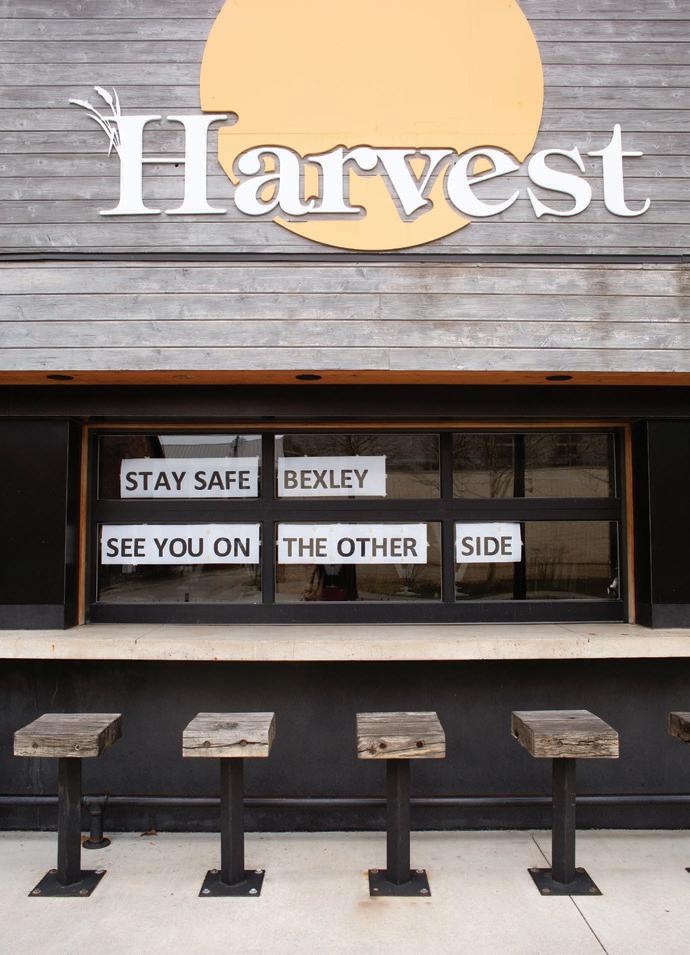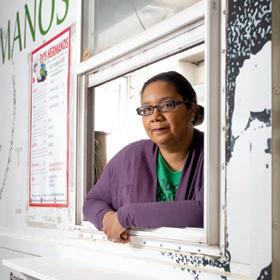
7 minute read
Dining | Industry
Fighting for Survival
What the pandemic means for our local restaurants and bars, as well as the people that make them run
By Jill MoorheAd
Carlos Bermudez, a bartender at The Light of Seven Matchsticks, was at work listening to Mike DeWine’s March 15 press conference when the governor made the announcement: In order to flatten the COVID-19 curve, all bars and restaurants must close as of 9 p.m. that evening, with exceptions for food delivery and carryout. Bermudez wasn’t surprised but describes the aftermath of Ohio’s dine-in ban in one word: “brutal.”
Bermudez, a single father of two boys, has since been laid off, losing 80 percent of his income when the bar closed indefinitely. He’s helped the speakeasy’s sister business in Worthington, Natalie’s Coal-Fired Pizza & Live Music, with takeout and delivery, but it’s not enough. “With a couple of mouths to feed, it’s serious business every day,” he says. “[The kids have] have seen me break down a couple times.”
The day of DeWine’s announcement, roughly 4,045 Franklin County restaurants (representing 83,373 employees, according to a 2017 Bureau of Labor Statistics report) had less than seven hours to make a decision: switch to carryout and delivery or shut their doors for the foreseeable future.
Four days later, Cameron Mitchell Restaurants closed all 36 of its restaurants across 12 states, furloughing 4,500 workers plus another 1,300 from Rusty Bucket Restaurant and Tavern’s 23 locations. The next day, Grow Restaurants closed six eateries, displacing 180 associates. And the following day, A&R Creative Group shuttered 11 restaurants, laying off 320 employees. According to a statewide poll of members from March 22 to 24, the Ohio Restaurant Association found that 47 percent of Ohio restaurants had closed their doors indefinitely, making the difficult decision to wait out the pandemic rather than give carryout and delivery a go.
Harvest Pizzeria in Bexley has closed indefinitely.
and the mother of his children are living separately, but he acknowledges that if things get desperate enough, they may be forced to cohabitate. “I’m betting that I have to find a new vocation. [My situation] changes hour by hour. I don’t know what day it is. Sundays are Thursdays.”
Time is off for Christine Deye, the head of brand integrity at A&R Creative Group, as well. “The last 14 days have been two-anda-half years,” she says. Deye spent two weeks creating daily plans, only to abandon them every time.
A&R felt the impact of the coronavirus pandemic early, after Ohio State University president Michael Drake’s March 12 announcement that the university would extend spring break and move to online learning. The restaurant group also runs Trism, Ethyl & Tank and Midway on High, all located near the Ohio Union. “Our Campus business was down 75 percent,” Deye says. “We started thinking about what it would look like if we had to reduce staff and hours. I was building a cash flow model.” In the period immediately following DeWine’s March 15 announcement, the restaurant group tried to make takeout and delivery work.
On March 21, A&R shut all of its restaurants down. (The Market Italian Village has since regrouped to offer Market Boxes, containing
reheatable meals, wine, produce and other goods.) “It was the hardest day in Ali’s life,” says Deye. The three remaining employees discussed whether to give team members a choice to stay open, but they were concerned that workers wouldn’t put their own health first. “We needed to be their parent,” Deye says, thinking of conversations with her own daughters. “We needed to make the decisions for them to be safe.”
On March 22, Deye made a new plan: She fired herself.


Relief Gets off to a Rocky Start
A state-mandated shutdown is having an immediate effect on the businesses. And DeWine’s announcement came without assurances of financial relief from Ohio, beyond a liquor buyback program and changes to the state’s unemployment law.
Most restaurants and bars don’t have months of cash reserves because they’re expanding and growing their businesses, says Steven Fireman, the president and general counsel at the Economic and Community Development Institute, a nonprofit that provides loans, training and other support to small businesses.
“To have your entire livelihood in the hands of the … government is scary,” says Chris Crader, founder of Grow Restaurants, which runs Harvest, The Sycamore and Cosecha Cocina. “If you’re going to mandate a shutdown, make sure that there is relief there the minute the doors are shut. [The state is] being proactive, but we are subject to their decisions.”
While the waiting period to file for unemployment in Ohio has been waived, the website has experienced significant delays, a big barrier for people who need to file weekly; payouts have also been delayed. And even though the Ohio Restaurant Association advocated for a sales tax holiday, restaurants were still responsible for paying March taxes. Meanwhile, it was 12 days after DeWine’s mandate—an eternity for cash-strapped members of the food service industry—that Congress passed the CARES Act, a stimulus package that includes $349 billion dollars in loans for small businesses administered through the Small Business Administration. ORA, is for restaurants to reduce expenses. The association suggests that restaurant owners work with vendors, utilities, lenders and landlords to get expenses deferred, followed by “tightening the workforce,” or mass layoffs. Restaurants can also learn to think like a startup again, says Fireman. “We’re back to how we started the business,” says Lisa Gutierrez, owner of Dos Hermanos, which until recently operated two food trucks, a taco cart, a stall in the North Market and two concession stands. “We’re inside one food truck now, and our North Market hours are reduced,” she says. Gutierrez believes she and her husband have lost 90 percent of their business. Weddings and graduation parties have asked for refunds; deliveries are down. The situation has prompted Gutierrez to get creative. Dos Hermanos added online ordering and started parking in neighborhoods.
Fireman believes that to salvage restaurants, it will take a community effort. He says ECDI is doing rent deferrals at its commissaries. “We hope and expect landlords to do the same. It is the Columbus way, and we’re expecting [landlords] to step up,” he says.
While some developers and landlords are offering deferrals, others aren’t. A representative at the Pizzuti Cos., which leases spaces to several Short North restaurants, says that it’s making decisions on a case-by-case basis.
John Barker, president and CEO of the ORA, hears promising stories from developers and larger businesses in Columbus. “They want their tenants to be there after this is all over. We’re hearing about lease holidays. We’re hearing Huntington Bank saying, ‘Let’s work together.’”
The Market Italian Village is offering boxes of produce and prepared meals for carryout; inset, Lisa Gutierrez, co-owner of Dos Hermanos, is still operating her food truck.
A Murky Future
Columbus is known for collaboration. Plus, the restaurant community is already showing its ingenuity.
Kathleen Day, owner of Katalina’s, started a Change.org petition that has around 2,000 signatures advocating for grants and other relief. Other initiatives are popping up weekly, from virtual happy hours that encourage tips for bartenders to efforts designed to feed restaurant workers and their families.
As of early April, it’s not clear when restaurants and bars will reopen, but Barker agrees the future of the industry is going to look different. “We still have a place for dine-in restaurants,” he says. “But people will get more comfortable with delivered and carryout food. Delivery last year was 3 percent of all customer traffic, but it’s the fastest growing arena, and you’re going to see more rapid growth.”
Bermudez remains committed to The Light of Seven Matchsticks. He moved to Columbus from New York City, and he views restaurants and nightlife as essential. “When I got here, I went digging into the arts and food culture right away,” he says. “And when this is over, I absolutely want to go back.” ◆










